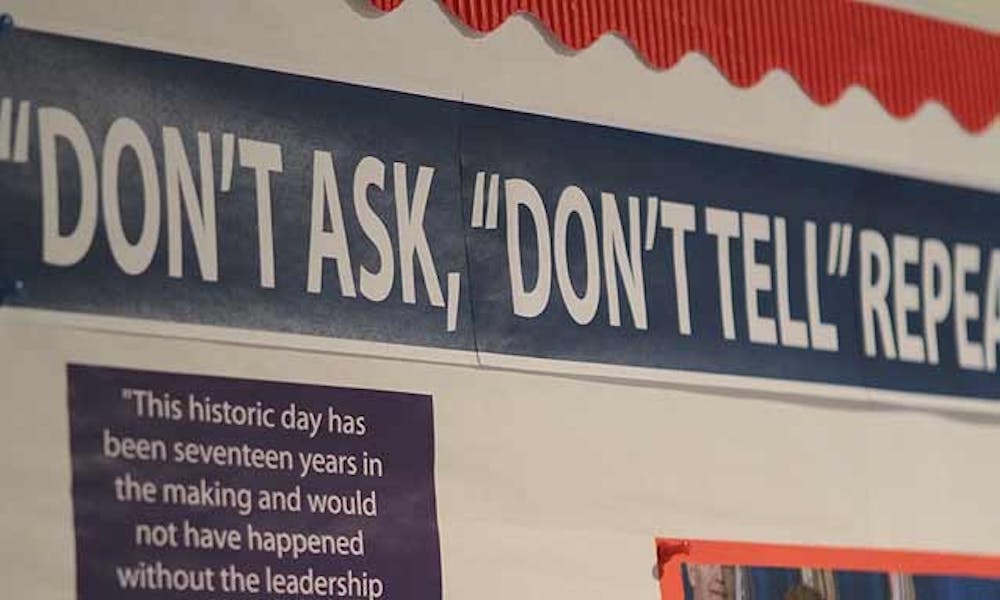The recent repeal of the military’s 17-year-old “don’t ask, don’t tell” policy, which ended the ban prohibiting homosexuals from serving openly in the military, may change the relationship between ROTC and colleges across the country.
Although Duke has maintained Reserve Officers’ Training Corps programs since World War II, many elite universities refused to participate in protest of DADT. But now that the policy’s repeal has been signed into law, institutions like Harvard, Yale and Columbia universities—which originally dropped ROTC in protest of the Vietnam War—are considering allowing the military back on their campuses. Other schools, including Princeton University, have indicated that they will not modify their ROTC policies in light of the ban’s repeal.
Duke’s ROTC program—which encompasses Army, Navy and Air Force divisions—will not immediately see changes regarding DADT. According to Lieutenant Colonel Andrew Koloski, a professor of military science for the Army ROTC program at Duke, the repeal will not go into effect until 60 days after President Barack Obama provides Congress with a written certification stating that “the Defense Department has prepared the necessary policies and regulations to make the changes, and the implementation of these changes is consistent with the standards of military readiness, military effectiveness, unit cohesion and recruiting and retention of military personnel.”
As it stands, the ban prohibits ROTC members from engaging in homosexual acts or verbal admissions of homosexuality. Koloski said offense allegations are reviewed by a general officer and that a service member’s termination from the military must be approved by the secretary of the Army as well as other Department of Defense officials.
Though the repeal is considered a substantial national policy change, Koloski said he thinks the atmosphere of Duke’s ROTC program will be affected minimally. He added that he does not expect the number of future applicants to significantly fluctuate as a result of the new law.
“I personally don’t think there will be a great deal of changes,” he said. “One of the great attributes of the Army ROTC program here at Duke is the diversity of our cadets and faculty. The program has a general culture of tolerance and encouraging diverse backgrounds and thinking. I think this will only continue in the future.”
The statute was first repealed by the House of Representatives before being passed by the Senate in a 65-31 vote in mid-December, and President Obama signed the bill Dec. 23.
Many Duke administrators had expressed their opposition to DADT. In May 2010, Bruce Kuniholm, dean of the Sanford School of Public Policy and a former U.S. Marine, joined the deans of eight other public policy schools in signing a letter to Congress calling for the law’s repeal.
“We are pleased that a policy that has been both unfair and divisive has been repealed,” Michael Schoenfeld, vice president for public affairs and government relations, wrote in an e-mail.
Despite past criticism of the statute, however, Koloski said the University has never faced any organized protest against ROTC’s presence on campus.
“To my knowledge there has never been any real organized objection to Army ROTC at Duke and certainly nothing related to DADT,” he said. “I think we have an outstanding relationship with the University and the community. Last Fall, Duke University sponsored its Military Appreciation Day the same weekend as the North Carolina Pride Parade and Festival here on East Campus.”
Janie Long, the director of Duke’s Center for Lesbian, Gay, Bisexual and Transgender Life was not available for comment. Junior Ollie Wilson, president of Blue Devils United, said Duke’s LGBT community already maintains a good relationship with the ROTC program. Going forward, he said he hopes the repeal will provide closeted LGBT-identified students in ROTC a more tolerant environment in which to consider coming out.
“I think it’s been a long time coming,” Wilson said. “There are already students who are LGBT who are ROTC, and I think the biggest difference we’ll see is that they’ll be able to be open and more comfortable in expressing themselves without fear of repercussion.”
Get The Chronicle straight to your inbox
Signup for our weekly newsletter. Cancel at any time.

